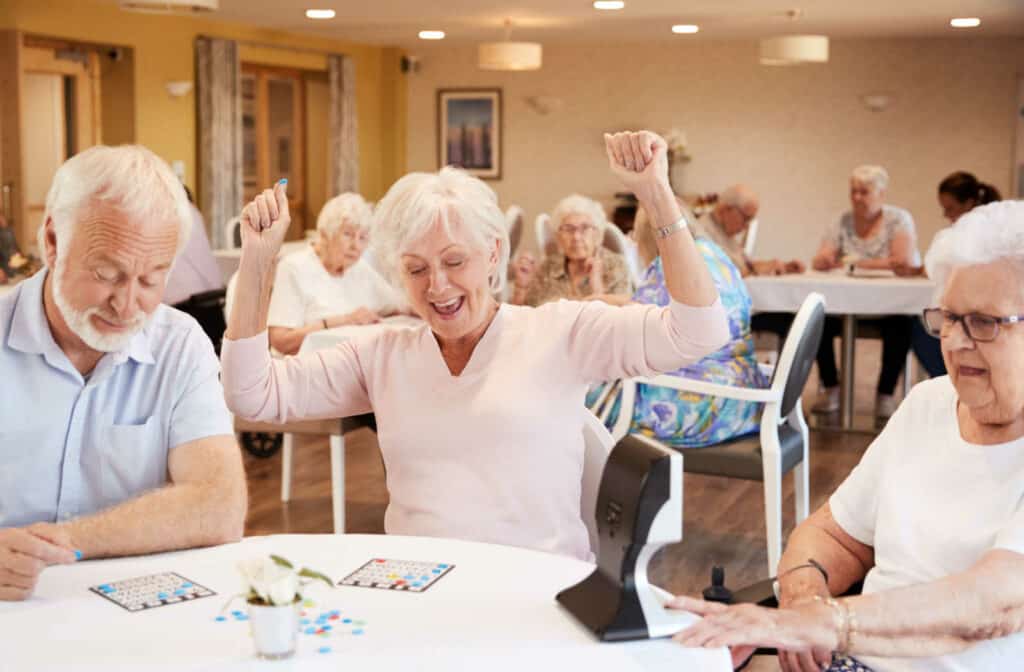Memory loss is a common occurrence for seniors, and it can be a challenging, frustrating experience for everybody involved. But fortunately, there are many ways to help a loved one who may be dealing with memory loss or memory impairment.
By creating a proper routine, prioritizing their overall health, and focusing on open and honest communication, you can help improve the quality of life for a loved one dealing with memory loss.
However, it’s important that you do what you can to avoid suffering caregiver burnout. There may be a point where you need to look into a memory care community for your loved one. These communities are an excellent way to be sure a loved one is getting the care they need!
What Are the Benefits of a Proper Routine?
A proper routine can be one of the most beneficial changes for seniors dealing with memory impairment, as this can help reduce anxiety and stress in a person’s day-to-day life. It can also help them remember their important daily tasks, like taking medications, making meals, or attending appointments.
Creating a routine can be challenging at first, so it helps to start small with simple activities they enjoy. Things like reading, walking, games, or puzzles are a good place to start, along with focusing on set times for other daily needs. By prioritizing set times for meals, medication, or exercise, you can help build a sense of structure.
It isn’t just structure, though—building a proper routine can help improve cognitive function. Because many of these things relate to a person’s health, including exercise, medication, and nutrition, you can help your loved one improve their quality of life.
The Importance of Mental & Physical Health
Both mental and physical health are important for maintaining a high quality of life, and this is especially true when it comes to a loved one with memory loss. Leading a healthy lifestyle can help slow down the progression of memory loss and improve their quality of life.
The Importance of Physical Exercise
Regular exercise can benefit both your body and mind. It improves your cardiovascular health and your mood and can help reduce stress levels in general. It can even help improve cognitive function and memory, as exercise promotes the release of certain chemicals in the brain that help support the maintenance of brain cells.
It’s important that you choose activities that are both beneficial and safe. Low-impact activities, like walking, swimming, or yoga can be excellent choices. By choosing low-impact and simpler activities, you can lower the risk of your loved one hurting themselves while exercising. If you’re unsure of the best way to start, you should speak to their doctor or medical professional. If they live in a memory care community, you should speak to the team around them!
Prioritizing Mental Health for a Loved One
When it comes to dealing with memory loss, it’s important to provide mental exercises as well. Regular brain-challenging activities can help improve cognitive function, memory, and quality of life.
Try looking into activities like:
- Memory training games like solitaire, puzzles, Sudoku, or crosswords to improve memory
- Learning new skills or hobbies to help build muscle memory
- Reading to learn new ideas and build new pathways in the brain
- Brain games, like standard board games
By choosing activities appropriate for their skill level, you can help improve their cognitive function while making the mental exercises fun. It’s also a great way to spend some quality time together!
The Importance of Honest Communication
Memory loss can sometimes make communication frustrating. It’s important to understand that your loved one may have trouble remembering things or expressing themselves. This makes it so that the most important things involved with communication are patience and empathy.
It helps to be patient and understanding of where they’re coming from. Avoid interruptions and let them finish their sentences and thoughts, as being cut off can make them feel frustrated or like you don’t care to let them finish speaking. Give them the time they need to express themselves!
Depending on the level of cognitive decline, you may need to change up the language you’re using. Shorter, simpler sentences can make a difference in helping someone understand what you’re saying. Avoiding complex words and jargon can help lessen confusion.
However, one of the most important things you can do is to prioritize positivity. While it’s especially important to acknowledge difficult topics and work through them together, including a positive outlook can help make things easier for both of you. It helps to include conversations about happier memories or to ask questions about their hobbies or interests. This can help them feel more comfortable and relaxed!
 Memory Care Communities for Seniors with Memory Loss
Memory Care Communities for Seniors with Memory Loss
Sometimes, it’s difficult to do everything yourself. Supporting another person takes a lot of time and energy. It may be time to think about a memory care community. These communities provide specialized care, like 24-hour access to medical care and assistance with daily activities that may be causing difficulty.
These communities also offer a variety of activities and programs to help support people dealing with memory loss, including all kinds of therapy options and game nights. They’re also equipped with security features to ensure the safety of each and every resident.
Memory care communities have experience in building routines, prioritizing physical and mental health, and honestly communicating with their residents. Providing residents with the support they need is one of the best ways to ensure they have a high quality of life.
It’s Okay to Ask for Help
Caring for a loved one can be emotionally and physically demanding, but it’s important to know that it’s okay to ask for help. Supporting somebody with memory loss requires patience, understanding, and an entire network of support. While there are strategies and other things you can do to improve their quality of life, you may sometimes need help yourself.
Memory care communities are the best way to help a loved one with memory loss. By providing your loved one with a safe and supportive environment tailored to suit their needs, you can best help a loved one with memory loss.
Schedule a tour with us here today at Regency Senior Living to give your loved one the care they deserve!


 Schedule a Tour Today!
Schedule a Tour Today!
 Memory Care Communities for Seniors with Memory Loss
Memory Care Communities for Seniors with Memory Loss






